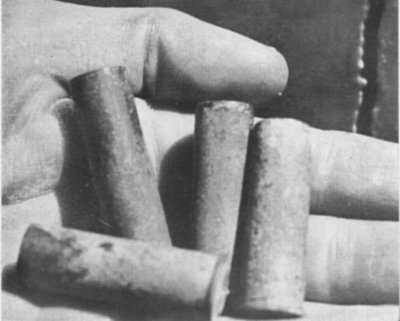

NO PATHWAY HERE
by John H Marsh
CHAPTER XII
A MYSTERY

The cartridges of German manufacture found on Marion Island.
A local newspaperman, George G. Young, Shipping Editor of the "Cape Times", happened to pass by in the course of his routine round of the harbour as the frigate was preparing to undock. He was aware that she was scheduled to spend Christmas in port and that many of her crew had already gone on Christmas leave. Now his curiosity was aroused, not only by the indications of her impending departure, but by the fact that there were Army and Air Force officers standing on deck. This was unusual and, sensing a story, he stopped to enquire further. He little imagined then how great a sensation he was to initiate through his zeal. But when senior S.A.N.F. officers on the quayside whom he approached hedged at his soundings, and, when questioned directly, said they were. not in a position to give any information, his suspicions were confirmed. Since the war ended, such secrecy about a ship's destination had not been known in Cape Town. As the vessel involved was a South African warship the local interest was all the greater. It was not surprising, therefore, that before the frigate was out of sight inquiries about her mission were being made on behalf of the newspaper in half-a-dozen different quarters. Before the paper went to bed that night they had reached Cabinet level.
The next day the " Cape Times " and other morning newspapers throughout the country came out with stories, prominently displayed and bearing such headlines as: "S.A. FRIGATE SAILS ON MYSTERY VOYAGE"; "SECRECY SHROUDS H.M.S.A.S. Transvaal'S DEPARTURE FROM CAPE TOWN"; "CREW RECALLED: WARSHIP SAILS IN A HURRY." The stories described how, before sailing, the frigate's bunkers had been topped-up with three weeks' oil supplies; also that special radio and signalling equipment, such as would be used in beach landings, had been taken aboard. Most of the papers speculated as to where the Transvaal could be going and, taking their lead from the "Cape Times", which announced that she had last been seen from Cape Point heading south, they nearly all suggested that she was bound for the Antarctic. Some tied up her hurried departure with the landing of the Australian scientific party on Heard Island, south of Kerguelen, a few days earlier, and the announcement a day or so before the Transvaal sailed that the Australians' ship was in trouble. Others came to the conclusion that the Transvaal was going to peg a claim for the Union in the Antarctic, though they were rather vague as to where and why.
The afternoon papers were unable to enlighten a curious public much further. They quoted official statements made in response to inquiries at S.A.N.F. Headquarters in Cape Town, at General Headquarters and at the Department of External Affairs in Pretoria, that the frigate was merely doing "a routine service exercise." They reported that the families of the Transvaal's men bad been left quite in the dark as to where their menfolk were going, and how long they might be away. This was surprising if the ship was in fact carrying out "a routine service exercise ". Nor did the newspapers overlook the disclosure that the Department of External Affairs had been informed about this "exercise". They legitimately assumed that matters concerning international diplomacy were involved.
Into this whirlpool of speculation, eddies from which had already appeared in the newspapers of Britain, America and other countries, there now dropped one pebble of seemingly definite information. Some of the evening newspapers stated categorically that the Transvaal had been sent down to the Antarctic to act as "policeman" in a dispute between rival whaling-ships over the rightful ownership of whales that had been killed and cast adrift to await collection later by ships of the same expedition.
Interest in the mystery of the Transvaal's movements continued as strong as ever. Day by day the newspapers made reference to the continued absence of news, while the authorities insisted that the frigate was merely engaged on a service exercise.
Copyright Mike Marsh (2025)